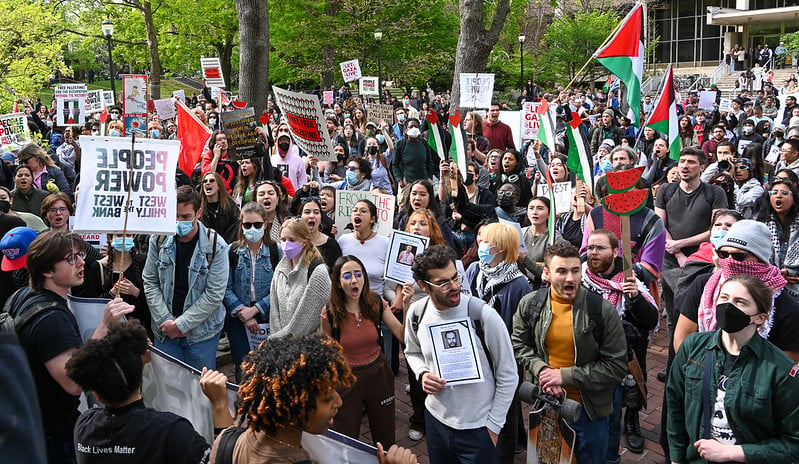Our job is to protect student curiosity

Dear Everyone,
The semester is starting at my home institution. Maybe you are also somehow affiliated with a university or college and starting a new academic year. If so, maybe you too are beginning this fall with a sense of fatigue and anger. This is supposed to be an exciting time of year where frosh and G1’s arrive for new experiences and other students return to continue their intellectual and professional journeys.
But this year is not like other years. This year, there is an ongoing genocide happening, and it is now almost a year old. This year, there are no universities in Gaza left. They have all been destroyed by IDF bombs. This year, Gaza’s children — the surviving ones — are experiencing a second year of learning loss. I don’t mean that they have to learn virtually at home. I mean many of them have no homes, have little or no internet, and are refugees camped out in the types of schools that the IDF is prone to bombing.
This year will begin with student protests. No one has told me about any plans for some. And even if they had, I would feel responsible for keeping their plans confidential, as long as I felt that no one’s safety was being threatened.
In at least one instance of confrontations between campus police and student anti-genocide protestors, I know that a staff member who is in a student-facing diversity role alerted the administration to student protest plans. The end result was a confrontation where students, who were entirely peaceful going in, were assaulted by police and are now facing criminal charges.
I’m not bringing up this story because I think the individual staff member who did this should be punished, named, or shamed. I don’t think it’s productive to draw attention to that individual. Instead, I think we should focus on the systemic issue at hand. What happened raises the question of what our responsibilities are when we are in student-facing roles, whether we are faculty (broadly defined) or staff, particularly if our job entails a stated commitment to and responsibility to sustaining diversity, equity, and inclusion.
For starters: it is not our job to snitch on students. Of course, it is our job to fulfill our duties as Title IX reporters and certainly if we are worried about the physical safety of any community member, we should act immediately to ensure everyone’s well-being. But: a peaceful protest, including an encampment, is not a threat to anyone. And, again, it is not our job to snitch on students.
What is our job in this context? It happens to be the case that I support the students and community members who have been engaging in sit-in’s, encampments, and many other actions in order to voice their position against the genocide and Israeli apartheid. But let’s say that they were taking all of these actions because they think that they should be allowed to host a wine bar in my quantum mechanics classes. Obviously, I would vigorously disagree with the idea of hosting a wine bar in my class, and I think it would be an incredible waste of time to protest for the right to have one. But I would support the right of the students to protest for it, up to and including an encampment.
Why? Because at university, students are meant to explore ideas, their identities, and what it means to be a citizen of the world. My job as a professor is to encourage and help sustain student curiosity. My job is to teach students how to sustain and engage their own curiosity. It is not my job to get in the way of that. That doesn’t mean I don’t get to have my own opinion or that there aren’t boundaries to what is appropriate for any given classroom. But college is exactly the place where students should be thinking deeply about their values and experimenting with how they are going to live them.
When students organize a protest, even when they are not defending human rights, they are always engaging in an intellectual as well as moral experiment. They are trying their hand at living their values. It is not our job to snitch on them. It is not our job to send the police after them. It is our job to let them be curious. To teach them that curiosity is part of being in community with others. To teach them that being curious about how to be in community with others — as those who engage in encampments clearly are — is the mark of a good citizen.
Student protests are part of the landscape of learning opportunities that colleges and universities offer. So, as this fall semester gets underway, let the students experiment with how to shape their world for the better, even if you disagree with the premise. And if you agree, maybe join the experiment. In this case, the students are doing what their teachers taught them: declaring loudly to anyone who will listen, NEVER AGAIN. We taught them that. We should be proud, not part of the machine that crushes them. We should oppose all attempts to silence our students, including criminalization.
I am enormously proud of the students who have sacrificed to fight back against a genocide. And I want to say that they give me hope. They do. I also acknowledge that it is hard to speak of hope while children and their families — their mothers, fathers, uncles, aunts, grandparents — run for their lives in an area where there is no safe zone, from bombs paid for by the United States government. But where there is resistance to injustice, there is possibility for liberation. And when students join others to experiment with creating a better world, they add to the possibility that we might actually create one.
Let the students protest, and don’t fucking snitch.
Free Palestine!
Chanda
